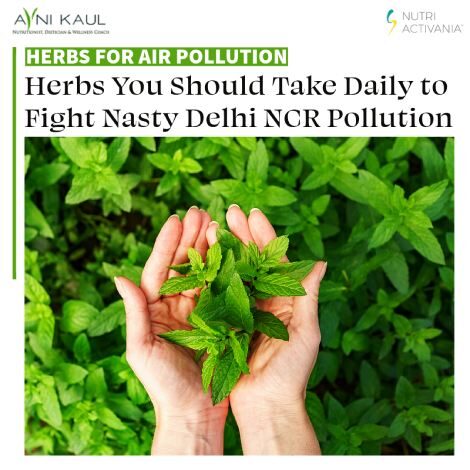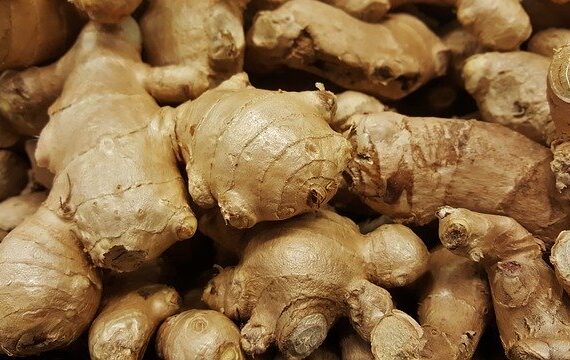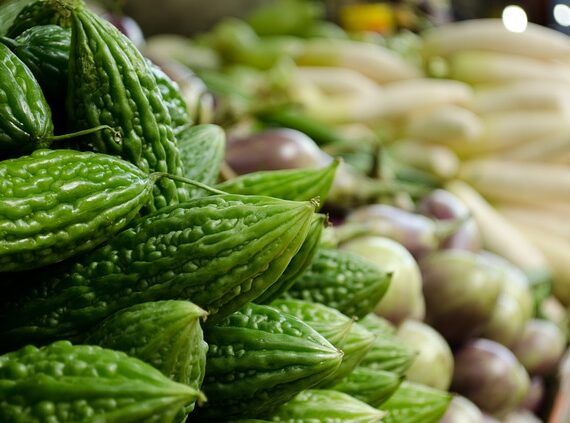The entire globe is grappling with the phenomenon of climate change and India is no exception. Delhi, the capital of India , consistently ranks among the most polluted globally, with it’s air quality index reaching hazardous levels, especially during the winter months. The culprit? A deadly cocktail of fossil fuel combustion, industrial emissions, and vehicular exhaust. This not only fuels climate change but also poses a severe threat to public health. As Delhi chokes on the toxic air, eminent dietician in Delhi, Avni Kaul, explores the amazing benefits of herbs that will shield us from the detrimental effects of pollution.
Which herbs would help you to counter the pollution?
Avni Kaul says that herbs, since ancient times, have been known to cure several health-related issues, and they are necessary to keep your health in top condition when pollution is extreme. Avni provides a list of some of the essential herbs to counter pollution. They are:
1. Tulsi (Holy Basil)
Tulsi, the “queen of herbs,” aids in fighting pollution with it’s anti-inflammatory and antibacterial properties. It acts as a natural shield for the respiratory system and detoxifies the body. Infuse Tulsi leaves in tea or chew them raw for enhanced resilience against pollutants. Boil tulsi leaves and ginger with a pinch of jaggery for a respiratory-friendly herbal tea. Basil leaves purify the air and lungs by eliminating pollutants, serving as a powerful air purifier.
Tulsi and Giloy, a powerful duo, offer remarkable benefits in combating the impact of air pollution. Their anti-allergenic, anti-inflammatory, and anti-bacterial properties safeguard the respiratory tract and internal organs. Consuming their juice twice daily enhances immunity and overall well-being amidst environmental challenges.
2. Turmeric
Can turmeric be your shield against pollution? This golden spice, commonly found in Indian kitchens, is packed with anti-inflammatory and antioxidant properties. Incorporating turmeric into your daily diet, through teas or meals, can bolster your respiratory system. Thanks to it’s active compound curcumin, turmeric helps reduce airway inflammation, making breathing easier. This ancient spice, combined with Aloe Vera serves as a natural remedy to combat the harmful effects of polluted air, providing a cleansing boost to your respiratory tract. Try a morning shot for a pollution-free start!
3. Pippali
Pippali, a potent yet lesser-known herb, boasts remarkable health benefits. It’s anti-bacterial and anti-inflammatory properties when combined with honey, create an effective remedy for sore throats. Rich in flavonoids, tannins, and nutrients like tannic acid and vitamins, Pippali aids in throat relief. This herbal duo acts as a natural cough suppressant, clearing phlegm and alleviating pain. Best consumed as a powder mixed with honey and warm water, Pippali proves beneficial for respiratory health, offering decongestant, bronchodilator, and expectorant effects.
4. Thyme
Thyme, rich in antioxidants and antimicrobial compounds like thymol, shows potential health benefits amid pollution. While direct evidence on pollution is limited, thyme’s antioxidants combat oxidative stress, linked to pollutants. Thymol’s antimicrobial properties may aid in pollution-related health concerns. Widely used in Italian cuisine, thyme has demonstrated clinical improvement in cough symptoms and enhances the quality of life, attributed to it’s antispasmodic qualities that ease breathing by reducing coughing and bronchial spasms.
5. Peppermint
Peppermint serves as a natural remedy for sinus troubles and congestion, offering swift relief. It’s invigorating scent not only delights the senses but also acts as a respiratory rescue. With decongestant properties, it clears nasal passages and calms respiratory discomfort. Whether incorporated into salads, or chutneys or enjoyed as a revitalizing tea, peppermint provides a refreshing escape from the challenges of pollution in places like Delhi.
6. Amla (Indian gooseberry)
Amla, the vitamin C powerhouse, serves as a natural shield against the oxidative stress in Delhi’s polluted air. Strengthening the immune system, this humble fruit aids in combating pollution’s harmful effects. Whether consumed raw, as amla juice, or in capsule form, it’s rich vitamin C content becomes a vital ally in promoting a healthier lifestyle amid environmental challenges.
In the face of Delhi’s toxic air, embracing the power of herbs like Tulsi, Turmeric, Pippali, Thyme, Peppermint, and Amla can provide a natural shield against pollution. These remedies offer a holistic approach, fortifying respiratory health and boosting immunity amidst environmental challenges.





